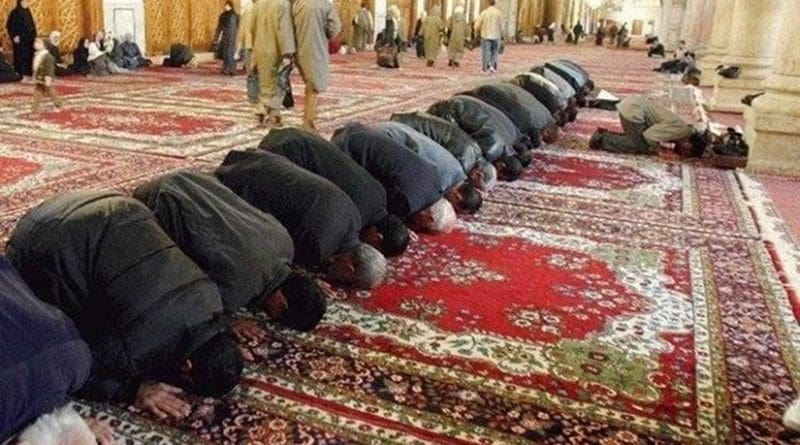Discussing Religious Freedom: Need For Religious Literacy – Analysis
By RSIS
A recent Washington Post article typifies the way discussion about religion is misleading and distorting in much media and academic commentary. Religious literacy is proposed as a solution.
By Paul Hedges*
The Washington Post published an article on 10 July 2015 by Daniel Philpott entitled “Are Muslim countries really unreceptive to religious freedom?” His argument was that despite Muslim-majority countries showing high patterns of repression, Islam was not the problem. While I agree with his conclusion there are problems with the way the discussion was framed.
Three statements stood out from the article: “a dearth of religious freedom in Islam”; “Islam clearly has considerably lower levels of religious freedom”; and “the presence of religiously free countries in Islam”. While one could surmise what he meant to say, it actually makes no sense: what is this generic “Islam”? Elsewhere, the writer uses the much better term “Muslim-majority countries”, which makes sense. Islam, like any religion, is diverse (not just Sunni and Shi’a, but also Sufism and others); it has changed over time. There is much diversity within Islam.
How not to talk about religion and Islam
For comparison, consider these phrases: “a dearth of religious freedom in democracy”, “democracy clearly has considerably lower levels of religious freedom” and “the presence of religiously free countries in democracy”. What is this “democracy”? What it means is countries with democratic systems.
Is this simply a semantic quibble? No. Particularly in the current global context, such language creates a homogenising perception of diverse religious traditions: in this case that there is one simple thing called Islam. It oversimplifies the conversation; indeed, as Philpott shows, reasons for lack of religious freedom in Muslim-majority countries comes from many factors, for instance some former Soviet states still enact quite strict regulations of which he mentions Uzbekistan as an example.
Further, it suggests that the answer may lie in some specific “religious” impulse within the tradition being discussed, in this case Islam, which hides far more complex social, political, and ideological factors. As such, it promotes a discussion on what scholars in the field would call sui generis religion. That is some “pure” form of spiritual realm divorced from other factors, existing in isolation. Whatever religion is, it only exists within the matrix of specific human societies.
Religious Freedom: Western or Islamic?
In his article, the writer also makes this claim: “Whereas some scholars view religious freedom as a Western value derived from Western history, the principle has a claim to universal validity.” This again is where religious literacy would be useful. There is considerable historical evidence which shows that the freedom of religion that Europe developed around the period we called the Enlightenment actually came from an admiration of the tolerance seen in the Ottoman Empire.
Controlling huge swathes of population across a massive geographical area, the Ottomans had many religious traditions represented amongst their subjects, and enacted policies to allow them to live together in relative harmony. Europe had nothing like this and so learnt from it.
Moreover, the Ottomans were not simply innovating but were building upon foundations going back to Muhammad and his early successors, the Four Rightly Guided Caliphs. Under the Pact of Umar and the dhimmi system, Christians, Jews, and in due course many others (e.g. Hindus, Zoroastrians, and Buddhists) were able to follow their religious teachings, organise their own communities, and live in relative freedom.
Certainly it was not perfect, and is not what we understand today as religious freedom – the jizya tax for protection under the dhimmi system, and the millet system which extended this to military levies under the Ottomans, are examples. Nevertheless, it is the basis of Western religious freedom: Islam, rather than Western values (even if Christian and Jewish biblical principles and texts were invoked for it), was the inspiration for our modern system. Religious literacy is a useful thing to have.
Is there religious freedom across the Islamic traditions?
Recognising the issues above, it would be possible to have a much more nuanced discussion about religious freedom in Muslim-majority countries. As the writer says, much is due to specific forms of secular regimes. However, we could see that the eighteenth century Wahhabi ideology which dominates in Saudi Arabia is also a factor, which often limits the freedom of Islamic groups it does not approve of.
Salafism is also often mentioned as a problematic ideology by many Western commentators; however, it involves going back to early Islam for its guide and so actually could drive greater religious freedom than is seen in many places by invoking the Pact of Umar, which regulated the rights and freedoms of non-Muslims living under Islamic rule.
The impacts of colonialism– and the way Western influence and continuing policies also impact many Muslim-majority nations also needs to be considered. Are restrictions on religious freedom coming from Islam or reactions to the West? Once we start discussing religion as something other than a sui generis monolithic entity we will be free to have a much more useful discussion.
I do not blame the writer for his language. The fact that it got published in The Washington Post and probably passed by the vast majority of readers is indicative of a grave level of religious illiteracy in society: this is true in academia, the media, politicians, the general public, and indeed even amongst most religious people and institutions (they may know their own tradition but they lack knowledge about what religion is generally, certainly at any academic level). Such problems are likely to recur until we see political commentators and journalists, amongst others, being trained in religious literacy.
*Paul Hedges is an Associate Professor with the Studies in Inter-Religious Relations in Plural Societies Programme at the S.Rajaratnam School of International Studies (RSIS), Nanyang Technological University, Singapore.

